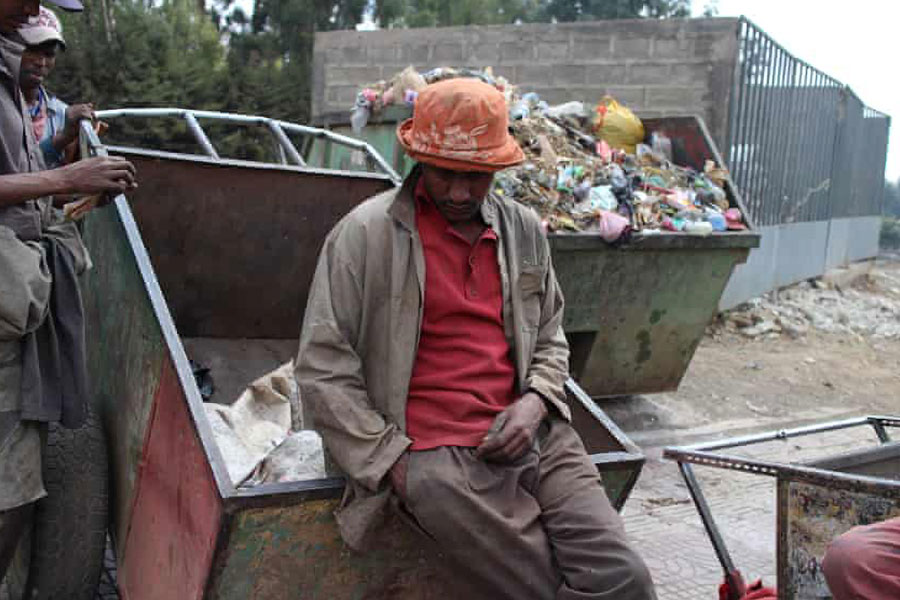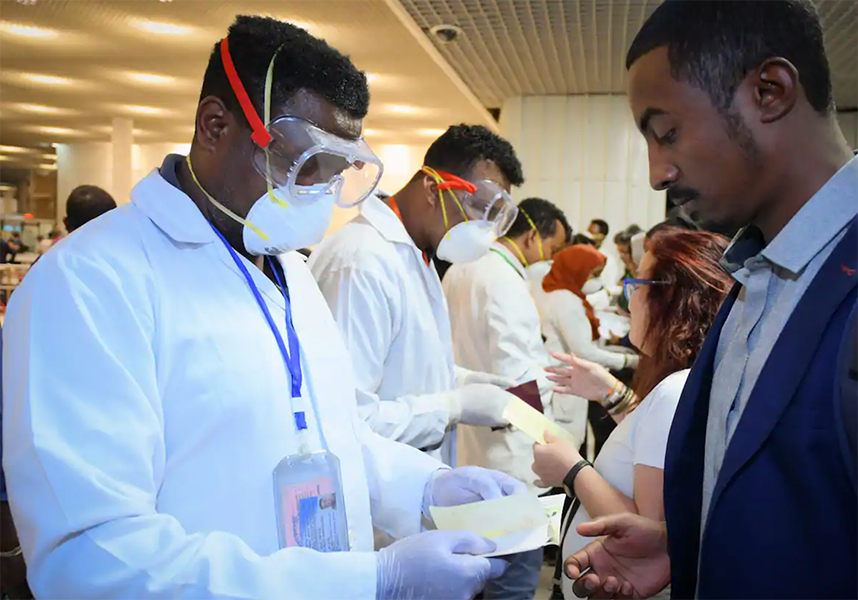
International Stories | Apr 07,2020
It was with a sense of despondency that the brand new minister of Health, Lia Tadesse (MD), gave a press briefing on the first confirmed case of the Novel Coronavirus Disease 2019 (COVID-19) in Ethiopia on March 13, 2020. Coming on the heels of a global panic over the crisis, it was briefly a time for solemnity.
The person was a 48-year-old Japanese male that had been visiting, holding meetings and travelling in Ethiopia for nine days. He had flown in from Burkina Faso, which recorded sub-Saharan Africa’s first Coronavirus case and death from the disease. It is not clear where he contracted the virus or from whom. But 117 individuals who had come into contact with this individual were traced; and of these, three more additional cases were confirmed, including an Ethiopian.
It was an apparent escalation to be taken note of; but no meaningful response would come from the government until days later.
Two days later, an Ethiopian who travelled from Dubai and had been put in isolation tested positive. It was followed a day later by a UK national who came from the same country. By last Friday, Coronavirus cases had jumped to nine - in just a week of the first announcement being made.
After public outcry about at least three gatherings - including a running event - held in the capital last weekend, even after the Minister announced the presence of the virus in the country, the authorities had begun taking cautionary measures. Large meetings and gatherings were postponed, lower learning institutions remain closed for at least two weeks, and hygiene and awareness campaigns were unveiled. Better late than never.
The administration of Prime Minister Abiy Ahmed (PhD) also began the supply of preventive materials and monitoring hoarding and hiking of prices of goods. Considering how many have been affected, this may seem a reasonable and prudent set of actions to take.
But taking into consideration how far more sophisticated countries severely underestimated and allowed the virus to nearly cripple their economies and the social lives of individuals, what Ethiopia is doing is not enough. It is all the more clearer when the experiences of countries that are currently suffering the most are considered.
Italy is the worst hit by the pandemic, having the highest ratio of death, with eight percent mortality. The first reported cases were on January 31, 2020. It was two Chinese tourists that tested positive for the disease. It did make the headlines, since the virus had already caused deaths and was spreading in China’s Hubei Province. But neither the first confirmed case, the first cluster of evidence on February 21, nor the first death a day after sounded the alarm on how devastating this was going to be.
A virus that is four-fifths of the time mild and believed to be more infectious than the flu is transmitted through tiny droplets remaining in the air. By February 23, 150 Italians had contracted it. A week later, a staggering 1,694 cases were reported. The week after that it was almost 6,000.
Panic set in, especially once Italy quarantined the region of Lombardy and 14 provinces in the northern part of the country. On March 9, the entire nation was put under quarantine. Retail services, except pharmacies and grocery stores, were closed and restrictions on movement were enforced. Countries such as Italy, Spain and the United States could have acted earlier, as Singapore, Taiwan and Hong Kong did. Earlier their authorities in the latter countries might have been judged for overreacting. In time they had little to regret.
It is indispensable to contain the spread of the virus as quickly as possible. Nonetheless, understanding the outbreak only through the prism of a disease affecting people is to lose sight of the full potential impact on society. The consequences of the epidemic of CODIV-19 is about the stretching of the healthcare system's capacity. This is not to mention how intensive care unit (ICU) beds, medications and medical equipment such as respirators and ventilators ran out.
The public healthcare systems are overwhelmed by a sudden surge in the number of people needing help, medical professionals would have no choice but to make the weighty decision to choose to treat patients with the highest chances of survival. The rest get sent home, awaiting a miracle.
This has been the case with almost all the countries that should have had a sophisticated, active and broader access to health infrastructure and resources to cope with such an outbreak. In times of such global crisis, these are the countries that were supposed to help others with weaker systems and lead the fight.
Yet they are buckling under the weight of the crisis. It can only be imagined what the consequences could be for a country such as Ethiopia.
With one of the lowest concentration of doctors in the world, an already stretched and underfunded healthcare system, Ethiopia’s ability to fight against an outbreak of the scale of Coronavirus is highly doubtful. There are about nine doctors for every 100,000 people (a third of the average of low-income countries), three hospital beds for every 10,000 people and only 400 hospitals for a country of 100 million.
In Addis Abeba last week, within days of news of the first individual to test positive, pharmacies and supermarkets ran out of hand sanitizer and face masks, rarely managing to refill their stocks afterwards. It serves as a glimpse into the consequences of a potential outbreak, which will impact more than the health of those who have acquired the virus.
With a health system co-opted to fight a pandemic, there will be suspensions or, at least, delay to the delivery of other health services. Beyond that, it would be a decapitating blow to the economy, as the kind of severe restrictions an outbreak will necessitate curtails production, communications and the delivery of goods and services. If not absolute, it will be near chaos.
In responding, it is only logical to demand the administration errs on the side of caution. It must not only be active in its response but aggressive in its actions. Sadly, the level of complacency - judging by the ongoing gatherings of the ruling party's foot soldiers for political orientations and the laidback attitude of the authorities - is frightening. There appears to be a widely held view at the highest echelon of power that there is no need to panic and overreact. Instead of underreacting and being right, they would somewhat exaggerate the potential threat and be wrong.
The administration can start by taking the potential for an outbreak far more seriously than it is doing at the moment. It should consider a more nuanced approach beyond and above the hygiene and awareness creation campaigns as well as efforts in limiting public gatherings.
The existing response also needs to be smarter. The initiatives to distribute preventive materials, such as hand sanitizer, at prices affordable to low-income classes is laudable. But distribution is encouraging crowding in violation of the primary advice by health professionals in the fight against such a deadly virus: the practice of social distancing.
This is where the government needs to focus its resources and institutions. It is the enforcement of restrictive social distancing that has helped countries such as Hong Kong, Taiwan and Singapore to fight off the worst effects of the outbreak. Besides closing schools, all mass events were cancelled, travel from hardest-hit areas of the world were restricted, and telecommuting enforced wherever possible.
Ethiopia has only one thing going for it. First China and now Europe present an opportunity to learn and respond accordingly. It can learn from the experiences of such countries and tap into the gradually rising awareness for global solidarity by asking for help.
The state, left with a health system unable to rise to the demand, will have little choice but to invoke its emergency powers. This can include declaring a state of emergency if the number of cases indicates rising at the 33pc average seen in countries where there is an epidemic at the moment. For once in a long time, the state will have the legitimate mandate for taking such extraordinary measures.
But such actions will matter only if they are taken proactively and timely.
PUBLISHED ON
Mar 21,2020 [ VOL
20 , NO
1038]

International Stories | Apr 07,2020

Commentaries | Apr 25,2020

International Stories | Apr 07,2020

Commentaries | Oct 31,2020

View From Arada | Oct 09,2021

Viewpoints | Sep 02,2023

Covid-19 | Mar 29,2020

Fortune News | Mar 13,2020

Viewpoints | Jul 18,2020

Fortune News | Mar 12,2020

Dec 22 , 2024 . By TIZITA SHEWAFERAW
Charged with transforming colossal state-owned enterprises into modern and competitiv...

Aug 18 , 2024 . By AKSAH ITALO
Although predictable Yonas Zerihun's job in the ride-hailing service is not immune to...

Jul 28 , 2024 . By TIZITA SHEWAFERAW
Unhabitual, perhaps too many, Samuel Gebreyohannes, 38, used to occasionally enjoy a couple of beers at breakfast. However, he recently swit...

Jul 13 , 2024 . By AKSAH ITALO
Investors who rely on tractors, trucks, and field vehicles for commuting, transporting commodities, and f...

Jul 5 , 2025
Six years ago, Ethiopia was the darling of international liberal commentators. A year...

Jun 28 , 2025
Meseret Damtie, the assertive auditor general, has never been shy about naming names...

Jun 21 , 2025
A well-worn adage says, “Budget is not destiny, but it is direction.” Examining t...

Jun 14 , 2025
Yet again, the Horn of Africa is bracing for trouble. A region already frayed by wars...